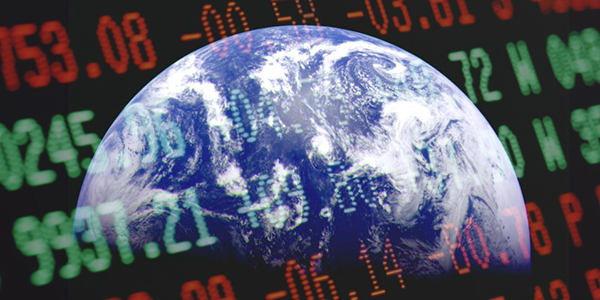
 |
Professor Karen Turner 10 April 2017 |
Karen will be speaking at our upcoming event Gross Domestic Problem: Measuring what matters on Tuesday 18 April, 2pm-4.30pm. Speakers include Professor Lorenzo Fioramonti, Professor Sir Harry Burns, Katherine Trebeck (Oxfam GB) and IPPI Executive Director David Wilson. Free event: registration essential.
Can GDP measure environmental wellbeing?
When environmentally-minded people consider GDP as a measure of wellbeing, they tend to identify two main problems.
First, GDP accounts in a positive way for the things that we pay for to prevent bad things from happening. This isn’t limited to environmental protection, it extends to things like paying for a police force and for national defence, as well as our local councils running waste disposal services.
Second, it fails to take account for our use and degradation of our natural environment. However, thinking about ‘valuing’ what economists would refer to as ‘natural capital’ is in itself very controversial – a couple of years back I remember a bit of a furore when campaigners put Ben Nevis up for sale on ebay or some such place, to make the point how can we put a price on such an invaluable natural asset.
As an economist, I would respond (after pointing out that the campaigners don’t hold the property rights to Ben Nevis so had no right to put it up for sale), if we don’t try to put a value on natural assets, how can we ensure they are properly recognised by those responsible for measuring our well-being?
GNP, GDP, NDP, GNI?
It can be a bit of a ‘catch-22’ situation, but over the years some very bright people have tried to find a sensible way forward. Indeed, we can get on what may be the right path just by thinking about how GDP is already adjusted to reflect different things.
First, GDP tells us how much income we generate – but it doesn’t tell us how much income actually accrues to us. To find that out, as a country, we move to Gross National Product, or Gross National Income – start with GDP and subtract all the income that doesn’t stay in the UK, and add on all the income UK residents earn abroad.
Second, GDP doesn’t account for the fact that, if we don’t re-invest sufficiently, we’ll run down our capital stock (all the machines, buildings etc., i.e. the wealth and assets that give us our productive capacity). Take the value of what we’ve run down away from GDP, we get Net Domestic Product; or take it away from the GNP/GNI, we get Net National Product. Is this a more accurate measure of our well-being? What about the problems above?
Sustainable Economic Welfare and Natural Capital Accounting
Quite a bit of work was done about a decade ago to try to identify and measure alternatives to GDP that truly reflect our wellbeing by correcting for a wide range of things, such as having to pay for policemen, wars and bin collections to stop bad things from happening to us, directly and/or through damage to our climate, local environment etc.
The most commonly discussed one was the Index of Sustainable Economic Welfare (ISEW). However, it didn’t get very far because of measurement issues. It is so difficult to value how different things may affect our wellbeing that the value of the ISEW, and the gap between that and GDP, were extremely sensitive to what was assumed about individual things entering the measure.
More sustained and widely accepted work has been done, particularly by the World Bank on ‘Natural Capital Accounting’ (NCA), which is now a more commonly used and descriptive term for what used to be called Green GDP. It reflects the Net National/Domestic Product adjustment already made by in National Accounts.
However, it focuses on accounting for not only our man-made assets, but the fact that our long term economic development relies on accumulating and managing a portfolio of assets. These include not only man-made and natural capital but also human and social capital.
Natural capital in GDP
So let’s focus on the limited representation of natural capital in GDP, or even its net variant(s). Natural capital includes consideration of the full contribution to our economic wellbeing of things like forests (not just the wood resource their capacity for carbon sequestration and air filtration).
Without consideration of this, GDP may give misleading signals about any nation’s economic performance and wellbeing. The World Bank estimate that for developing countries natural capital accounts for around 36% of total wealth.
However, the World Bank no longer focus on adjusting GDP as such. Through a project and partnership called WAVES (Wealth Accounting and the Valuation of Ecosystem Services) and building on the UN Statistical Commission for the System of Environmental and Economic Accounts (SEEA ) they are working to promote sustainable development by ensuring that natural resources are mainstreamed into development planning and national economic accounting.
Don’t obsess on GDP; focus on green jobs and income
The main message is that we can have more measures or indicators other than GDP to inform our decisions; but are they better and should we use them? GDP – and its national and net variants – has a role to play; indeed playing the GDP card can help us ‘go green’.
While some people may feel uncomfortable that GDP positively accounts for the fact that we spend money on things like clearing up waste, this means jobs and income both directly in doing things like emptying the bins (we have an industry built up around it) and throughout local and national supply chains. This is an argument we’ve built up in our own research around making the case for carbon capture and storage (CCS).
Our argument focuses on thinking about the stages involved facilitating the capture, transportation and storage of carbon as economic service activities that generate jobs and GDP. If CCS is recognised in this way – rather than as a costly technology - it may be more likely that wider policy and political support can be engaged in getting some of the big ‘game changers’ that may actually get us to our carbon targets up and running.